The guide is in process of reworking! Maps section will be expanded. Solo laning section will be added. All other Information is up to date.
Content
Changelog.
Intro.
Artanis Play style.
When to pick
 Artanis in Ranked play?
Artanis in Ranked play?
Ability usage.
Ability Combinations.
The example builds.
Talents in depth.
How to play the maps.
Changelog. Top
Updated 05.03.2018 - Did another pass over the guide. Fixed some minor issues and inconsistencies.
Updated 28.07.2017 - Complete rework on the Talents in depth section. Removed the Understanding the talents and How to pick your talents section since they were no longer relevant. restructured content to include How to play the maps section. Also spellcheck.
Updated 26.07.2017 - Patch 2.26.3. Complete rework after hero rework.
 Artanis
Artanis was reworked, and he traded his ability to tank damage, for increase in the damage he can deal himself, as well as big utility increase, allowing him to cast
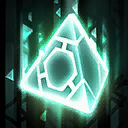 Phase Prism
Phase Prism during
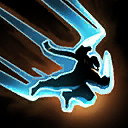 Blade Dash
Blade Dash. I changed guide name and all the builds. Replaced the Treats selection, as it was no longer true. New Intro section. Added Playstile Chapter. Reworked the "When to pick in ranked play" chapter. Rearranged chapters. Reworked ability use chapter. Added "Ability Combinations." chapter. Reworked The example builds chapter.
Updated 07.07.2016 - Added Anti-mage build.
Updated 19.05.2016(Chromie patch) - Added "When to pick
 Artanis
Artanis in Ranked play?" section. Added "10: Lt. Morales. (Hero combination)." build. Did some minor tweaks to remove ambiguity. Updated impact of questing talents.
Updated 09.05.2016 - Added "Understanding the talents." section. Made changes to level 4 and 7 talents after further testing. Also edited one of the tank builds.
Updated patch 17.2 - lots of changes after adding charge to
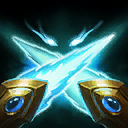 Twin Blades.
Twin Blades.
After "charge" was added to
 Twin Blades
Twin Blades the playstile was dramatically altered, and additional opportunities were open. Now you can play
 Artanis
Artanis more aggressive while still safe, since you can initiate from a distance.
 Artanis
Artanis deals damage primarily with auto attacks and need to be able to close the gap fast, or he is useless due to his small attack range and slow move speed. On top of that his trait
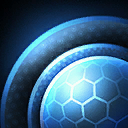 Shield Overload
Shield Overload is refreshed with auto attacks, and he has no escape mechanic. Similarly to a lot of melee assassins and other bruisers -
 Sonya
Sonya,
 Illidan
Illidan,
 Kerrigan
Kerrigan... he has to keep attacking to survive longer. Finally that hole was filled and now
 Artanis
Artanis has the potential to become a primary pick in many games.
Updated and reorganized 12.04.2016. - Added how to pick talents section.
Updated patch 17 - Added builds, detailed talent descriptions, Adjusted builds, according to latest patch changes.
Created - patch 16.5
Intro. Top
 Artanis
Artanis the Hierarch of the Protos. This mighty warrior comes charging to the Nexus. Just as all Protos,
 Artanis
Artanis is fully committed to his cause, and relentless in his pursuit of victory.
He is also extremely flexible, in his combat style.
 Artanis
Artanis could become nearly immortal frontline bruiser, who can just keep pushing the aggression shredding tanks and squishies alike. Or Crowd Control play -maker that excels in long drawn out fights. Or if needed AOE damage dealer, capable of dominating map objectives. He can sustain through the longest of battles, bringing pain and suffering to all his enemies, or excel at bursting down the opposition 1 hero at a time.
In the guide below, I will try to explain how a skilled player could fit
 Artanis
Artanis in most team compositions, and bring victory to his team in variety of ways. I will go into the specifics of his different play-stiles. How to get most out of him on all of the battlegrounds. Hopefully I can give you some of my knowledge, and after reading all of my silly ramblings, you will be ready to take the Nexus by a storm. :)
Artanis Play style. Top
It has to be noted, that playstyles and builds are 2 different things! Playstyles are the way you behave in the game, while talent builds are the complimentary powerups you get to benefit the most from your playstile.
Artanis has 2 playstyles, he utilizes:
1 - In your face aggressive style "My blades for Aiur! fight me if you dare coward!"
2 - Playmaker CC style "Nope. Nope! Noope!!! Oh get over here!"
The distinguishing factor is what team is the aggressor, (if there is one), and what role you have to play in the team composition. You can also look at it like 2 aspects of the same playstile if you want.
In your face aggressive style
This is most similar to what the old
 Artanis
Artanis used to be. It is the usual way to play if your team is build around hard engage on the enemy team, or if you have 2 sustain heavy teams, that will battle for longer periods of time. Also it suits
 Artanis
Artanis, that is played as a team bruiser and fills the melee damage dealer role. It works best against melee heavy teams, double support or double tank. The idea is that you are your team frontline. Your positioning is right behind the tank. You get in fights after the tank, and keep going until the enemy is ether dead or in full retreat. You hit whatever hero is dumb enough to stay near you, and you use your
 Phase Prism
Phase Prism, or sometimes
 Blade Dash
Blade Dash into
 Phase Prism
Phase Prism combo, to prevent an enemy from running away, or as follow up to tank CC. Sometimes you use it as an opener to drag an enemy into your team, to be blown up. (Combos are explained later on.) Best to engage with
 Twin Blades
Twin Blades and follow up with
 Phase Prism
Phase Prism, while keeping
 Blade Dash
Blade Dash for shield reset and momentum stopper in case the enemy tries to counter engage on you. This style works best when you are on the offensive and looking for strong engage, to blow up someone. Use this behavior when ahead, or at equal standing with the other team, and you want to engage them. This is most of the time btw. The whole point is to start with strong engage and carry the momentum into a short but devastating battle. But even if it doesn't end fast, as long as you have health above 30% you can keep going.
If you are at low health at some point, and can move away, disengaging orderly - do it. Let your shield cooldown to come off, and for the support to heal you a bit and then change to "Playmaker CC style", as you can't really charge head on and at this point your frontal engage is already over.
But if you have no chance of survival, try to get a return kill. I would usually say when the tank disengages run, but
 Artanis
Artanis can't disengage, so should the battle go bad, ping retreat to your team and hold the enemy in place for as long as you can, getting them time to run away. Keep in mind that doesn't mean to sacrifice yourself, if you can run away. And just running is more effective than most people realize.
Playmaker CC style.
This one is relatively new and is reliant on the opportunism mixed with defensive posture. It actually is based on the new functionality of casting
 Phase Prism
Phase Prism while in the middle of
 Blade Dash
Blade Dash. That behavior is best suited for the times you expect the other team to engage on you. This is the posture you use when in poke battles, or when behind in XP, when your team doesn't want to advance aggressively. Also when you are more of a offTank, and have to provide as much protection to your team as you can. It is meant to get a pick in case the opportunity presents itself, or to counter enemy attempt of aggression. The idea is to use the Q->E combo to swap an enemy way out of the position they wan't to be in. Remember, that the other styles use the combos too, but this one is focused on it. Also no - the long range swap is not the only use for your abilities. If you are using it as a replacement
 Stitches
Stitches
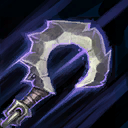 Hook
Hook, you are doing it wrong. While the "In your face aggressive style" uses
 Phase Prism
Phase Prism and
 Blade Dash
Blade Dash to enhance your aggression, the "Playmaker CC style" is centered around using the swap in the perfect time to get a pick, while not having to commit to a full fight. The other major use is in defensive situations, to prevent aggression, by swamping an enemy diver away, over terain, off of an objective zone etc... Also stopping a channeled ability, or repositioning yourself and an enemy to gain momentary advantage during enemy aggression. With this you should mind your position and stand a bit further back. If an enemy dives the backline you use
 Blade Dash
Blade Dash to the side and
 Phase Prism
Phase Prism to trow them away. If they go past you, you can just
 Phase Prism
Phase Prism someone like
 The Butcher
The Butcher, so they are no longer deep on top of your backline, and you actually retreat yourself in a much safer position. This style is also heavily dependent on having
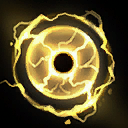 Suppression Pulse
Suppression Pulse to negate enemy aggression.
Playstyle and builds.
In this guide on
 Artanis
Artanis, you can see 3 different talent variations of a bruiser build and 2 variations of an offTank build. Each of those builds suits one playstyle better than the other, and each bring some change, that alters the game in some meaningful manner. But don't forget that in the core
 Artanis
Artanis is the same hero, and all of the aspects he has are used more or less in each game. So experiment and find what works best for you.
And remember:
The goal of a bruiser is to do as much damage to the enemy as possible, while being able to survive all that they manage to trow at him and hopefully also negate some damage from his team.
Basically You try to build a bruiser for as much damage as you can, while not be too greedy, and take defensive talents when you must. Also remember not all damage is hero damage.
When to pick Artanis in Ranked play? Top
Obviously a good question.
First: As any hero only take
 Artanis
Artanis, when you feel confident, that you can play him well enough and adapt your build to the game you are in.
Second: Play him only if you know your team will take another front-line hero (melee with self-sustain, preferably good CC). Most of the time you will have to be the team solo laner, when playing
 Artanis
Artanis, so keep that in mind, and during the draft pick him when you are confident you can deal with the enemy solo laner, and not lose the lane.
Third: To counter.
 Artanis
Artanis can counter 3 types of heroes.
1 - Mobile heroes, that have to get close to your team like
 Tracer
Tracer or
 Genji
Genji, struggle to deal with
 Artanis
Artanis, as he can charge them with
 Twin Blades
Twin Blades, effectively creating a zone around him, they can't enter without eating damage. Also he can take prolonged dps like that with ease, because of his shields, so
 Tracer
Tracer and
 Genji
Genji can't really harm him. That becomes even harder to deal with after level 16, when you can take
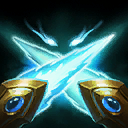 Zealot Charge
Zealot Charge for extra range.
2 - Auto-attack heroes, who rely on their attacks to damage, or sustain can be shut down with
 Suppression Pulse
Suppression Pulse.
 The Butcher
The Butcher,
 Illidan
Illidan,
 Malthael
Malthael,
 Kharazim
Kharazim,
 Varian
Varian with
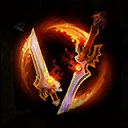 Twin Blades of Fury
Twin Blades of Fury and
 Lunara
Lunara all benefit from their auto-attacks, with more than just damage. Shutting that down is very strong. But even heroes that only deal damage with their auto-attacks can be nullified for a time like
 Valla
Valla,
 Tychus
Tychus,
 Cassia
Cassia. Not to mention that even heroes that are not primarily AA damage dealers still rely on auto-attacks, so you get benefit no matter what. Keep your
 Suppression Pulse
Suppression Pulse ready, to drop on those heroes'es heads, as soon as they hard engage
anyone,
anywhere on the map! 4 seconds of blind basically prevents a ton of damage, and therefore shuts down
 The Butcher
The Butcher's self-healing,
 Illidan
Illidan's healing and cooldown reduction and so on and so on.
Just remember that even AA DPS heroes have more utility than just auto-attacks, and the rest they bring to the table makes the success of
 Suppression Pulse differ greatly on a case by case basis.
3 - Low mobility heroes,
Suppression Pulse differ greatly on a case by case basis.
3 - Low mobility heroes, can be swapped out of position, and basically die, because they can't retreat from your team. Targets like
 Jaina
Jaina,
 Gul'dan
Gul'dan,
 Nazeebo
Nazeebo and so on are perfect for that.
Last word to the wise: If you have
 Lt. Morales
Lt. Morales in the team, consider taking
 Artanis
Artanis and get her to heal you, and use her
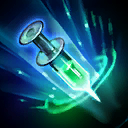 Stim Drone
Stim Drone on you. You turn into
 Illidan
Illidan on steroids. Literally! :) Before ther rework you could basically charge and kill a keep while all 5 enemy heroes are alive. Like you are in the Dragon Knight on
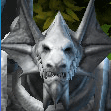 Dragon Shire
Dragon Shire. Now the shield reset in not nearly as good, but the combination is still strong. Especially with other attack speed buffs.
Ability usage. Top
First you must understand when to use
 Artanis
Artanis's abilities, to pick the proper talents.
There are 4 reasons to use
 Blade Dash
Blade Dash.
1 - As a finishing move against a hero, that is running away, and you have no other means to hit him left.
2 - To clear minion waves.
3 - To recharge your
 Shield Overload faster
Shield Overload faster by hitting heroes, while dodgeing abilities trown at you.
4 - To set up for a combo swap with
 Phase Prism.
Phase Prism.
In all other situations it will put you in more trouble than you think. While fighting heroes if you use
 Blade Dash
Blade Dash you are not landing auto-attacks, and AA reduces the cool-down of
 Shield Overload
Shield Overload. Mid flight you can be interrupted and end in terrible position. Worst of all, your opponents know that you will return to the starting point and will catch you with abilities that have delayed effect, which you would have avoided otherwise. In case you are surrounded and your team is near, using
 Blade Dash
Blade Dash in their direction can save your live, by giving you a precious 2 seconds, but don't rely on that a lot. It rarely works. You want to
 Blade Dash
Blade Dash over as many enemy heroes as possible, once you drop below 75% health.
 Phase Prism
Phase Prism should be used offensively in 2 cases.
1 - To grab a retreating enemy hero, and continue to do damage. The way to make sure
 Phase Prism
Phase Prism will connect, is to use it right after you charge a hero with
 Twin Blades
Twin Blades. That way they can't run out of range in time, because you will be standing right next to them. After the swap of places make sure to body-block the retreating hero, so he can't run away from you.
2 - As part of
 Blade Dash into
Blade Dash into
 Phase Prism combination.
Phase Prism combination. Using
 Phase Prism
Phase Prism to initiate a team-fight is a good idea, only when you have your whole team with you, since it will put you in the middle of the enemy team, and you can die. Pull a hero towards your team, letting them damage him. Use
 Twin Blades
Twin Blades immediately after that, to charge back to the target, and in range of your teammates. Then keep body-blocking the target. (Works similarly to
 E.T.C.
E.T.C.'s combo of
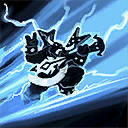 Powerslide
Powerslide -
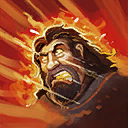 Face Melt
Face Melt, but its way more dangerous for you.) Keep in mind that there are far more cases to use a swap combination, and they are usually more effective, as they are not nearly as telegraphed as the long range swap, and will not put you in bad position. More on that in the Combos chapter.
Other than that you want to have
 Phase Prism off cool-down so you can use it defensively. It is your only source of escape or peel.
Phase Prism off cool-down so you can use it defensively. It is your only source of escape or peel.
In case you are flanked or attacked from the back, swap with the flanking enemy hero to try and escape. This is your only way to retreat, but its not all that effective. Mostly it prevents the other team from body-blocking you. In team fight use it to change position so you can switch places with an enemy attacking your back-line, to pull the tank away from his squish backline, while you get on top of it yourself, or to interrupt channeling abilities (like
 Li-Ming
Li-Ming's
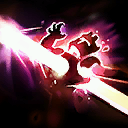 Disintegrate
Disintegrate or
 E.T.C.
E.T.C.'s
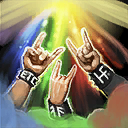 Mosh Pit
Mosh Pit).
Be careful, because
 Phase Prism is your only crowd control ability, and is very hard to land, compared with most other skill-shots.
Phase Prism is your only crowd control ability, and is very hard to land, compared with most other skill-shots. Practice makes perfect. In fact if you can't land it properly at least every 4 out of 5 times, you should not play
 Artanis
Artanis in Hero League, as you won't be able to protect your team or make plays for them (disrupting enemy heroes and putting them in a position, for your team to kill safely).
The simplest and most used ability of
 Artanis
Artanis. It is used to close the gap between you and the enemy, and or to boost your DPS. An important thing you need to know about it, is timing the casting. Just like
 The Butcher
The Butcher's
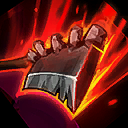 Hamstring
Hamstring,
 Twin Blades
Twin Blades is best used right after you auto attack. That way you deliver 3 auto attacks in 1 second, since
 Twin Blades
Twin Blades hits immediately. If you use
 Twin Blades
Twin Blades to begin your attack you are loosing 1 auto attack worth of damage, so you should be pre-casting
 Twin Blades
Twin Blades only when you are trying to close the gap to a hero with the charge added to the ability.
Ability Combinations. Top
There are multiple ways to combine your abilities for greater results, and some flashy plays, that can win you fights, by careful positioning play and swaps. I have put a few down, that can be done with all cooldowns ready to use, but once the fight begins the cooldowns will make it so have to ajust to the situation. It can be hard at first, but when you get into the flow of the hero, and instinctively know when your cooldowns will be off, things get much easier.
"The God swap" premis and the basis for ability combinations.
This term appeared, right after the rework
 Artanis
Artanis receved. The premis is that with the functionality of casting
 Phase Prism
Phase Prism during
 Blade Dash
Blade Dash, you can pull people into your team from extream ranges, by dashing toward the enemy team, and as you reach the end point of
 Blade Dash
Blade Dash, you cast
 Phase Prism
Phase Prism aimed at a target, positioned at 1/2 to 2/3 of the lenght of
 Phase Prism
Phase Prism away. Since
 Phase Prism
Phase Prism has high travel time, and
 Artanis
Artanis is already on the return of
 Blade Dash
Blade Dash, the
 Phase Prism
Phase Prism will connect when he returns at the origin point. This will swap
 Artanis
Artanis and the target a distance equal to the range of both
 Blade Dash
Blade Dash and
 Phase Prism
Phase Prism combined. It has also been called
 Stitches
Stitches
 Hook
Hook 2.0.
For someone who rarely plays
 Artanis
Artanis, this was "Awesome" and "OP", winning the hero some momentary glory. However peopel who have been playing
 Artanis
Artanis since release, realised very well how inacurate and plainly wrong this is.
Or perhaps the term incomplete is better than wrong in this case. You see
 Artanis
Artanis alwyes had the ability to engage with
 Phase Prism
Phase Prism, the change was the range, which often ensured a kill. But all the problems of such engage remained. Actually they became worse. The thing about pulling someone in your team follows the third law of Neuton -
 Artanis
Artanis flips himself in the middle of the enemy team. This is why the
 Hook
Hook comparison was so bad.
 Artanis
Artanis has no mobility, and as he is stuck in the middle of the enemy team, he can just be blown up. The rework reduced his ability to tank damge, and since you now also use
 Blade Dash
Blade Dash before the swap, that leaves
 Artanis
Artanis in a certain death situation after the swap. Not to mention it could be avoided easily, since it is highly telegrapfed engage. Or even worse. The enemy tank could walk into it on purpose. And if that is someone like
 E.T.C.
E.T.C. or
 Diablo
Diablo your whole team can be in a lot of troble. It should have been caled "The devil swap" instead.
But why point out all of the flaws? Why do I talk about it at all?
"The God Swap" is incomplete. And also it was used to start engagements that could easily end up being trading 1 for 1. However with the premis known, as well as the problems, this can be used as the base for great plays.
Offensive combinations.
The long range swap.
 Blade Dash
Blade Dash->
 Phase Prism
Phase Prism->
 Twin Blades
Twin Blades
This is actually the exact same thing, as "The God swap", with 2 very major improvements.
1 - After the swap you emidiatelly turn around and use
 Twin Blades on the target you just swaped.
Twin Blades on the target you just swaped. This is best acheved if you cast
 Blade Dash
Blade Dash from shorter distance and in an angle, so the actual swap distance is shorter, letting you use the charge from
 Twin Blades
Twin Blades almost emidiatelly, and get in a position to bodyblock the enemy hero you swaped. Think of it like the
 E.T.C.
E.T.C. combo of
 Powerslide
Powerslide and
 Face Melt
Face Melt.
2 - You do not use this as the engagement starter! This sort of swap can be used while a poke fight is going on, or after your tank starts an engagemen, or in any other situation, where the enemy attention is split. But never, ever to start the fight, or the enemy attention will be completely focused on you. Only exception is when your whole team is trying to force a fight, while the enemy team is retreating, trying to avoid one. Also if you have your cooldowns, and are close enough to do this while the enemy is retreating, you will secure a kill 100% of the time.
That is all there is to making a flawed "combo" into very usefull tool for your team.
The long range charge.
 Blade Dash
Blade Dash->
 Phase Prism
Phase Prism->Auto Attack->
 Twin Blades
Twin Blades
The sequence of abilities here remain the same as "The long range swap", but the execution is different. The idea behind this is not to swap with a target but to charge a target.
"The long range swap" takes time, while this is near instant, and is ment to burst a target down. You use it from range, that is about as long as the lenght of
 Blade Dash
Blade Dash. Idealy just a bit longer. You
 Blade Dash
Blade Dash toward them and at the high point of the dash you use
 Phase Prism
Phase Prism from point blank range. What happens is that you actually charge the enemy into bodyblock position. This charge is about 2 times longer than the base charge distance of
 Twin Blades
Twin Blades, and can suprise a lot of people, who thought they are just outside of your range. Having longer range is very importaint, but being in bodyblock position is equally as importaint. If the enemy is some squish hero, that is low on health, you can use 1 auto attack and then finish them off with
 Twin Blades
Twin Blades. But if they have a bit more health, use the bodyblock spot to land 2 or 3 attacks if you can, so casting
 Twin Blades
Twin Blades will finish them off. Remember that
 Twin Blades
Twin Blades has a short charge distance too.
Other uses are to push yourself closer to the enemy team's backline, or all the way on top of the squishies. If you are trying to reach that pesky
 Gul'dan
Gul'dan, or
 Jaina
Jaina, but she is out of range, you can perform a long range charge on the enemy tank or bruiser with
 Blade Dash
Blade Dash->
 Phase Prism
Phase Prism, and then use
 Twin Blades
Twin Blades's charge on the target you want. Just keep in mind, that doing it this way, drains all your cooldowns, so all you will be doing is force the enemy squish hero back, providing zoning for the team, but you will be putting yourself in a lot of danger. So perform this with caution, as it is worth it, when that 1 target you are zoning is the cause of consistently loosing previous fights, but not in many other situations. Also it leaves you deep in the enemy team space, with their frontliner right behind you, and your target can kite you and counter engage. Having
 Suppression Pulse
Suppression Pulse ready is very important.
It is important to note, that if you take
 Zealot Charge at 16, it is better to stop using "The long range charge".
Zealot Charge at 16, it is better to stop using "The long range charge".
 Zealot Charge makes the range of
Zealot Charge makes the range of
 Twin Blades about the same as "The long range charge", so using what I call "The old school engage" is better.
Twin Blades about the same as "The long range charge", so using what I call "The old school engage" is better.
The old school engage.
 Twin Blades
Twin Blades->Auto Attack->
 Phase Prism
Phase Prism->Auto Attack->Auto Attack->
 Blade Dash
This is the most effective engagement combination you have. However it is also the hardest to do.
Blade Dash
This is the most effective engagement combination you have. However it is also the hardest to do. This was the way you would engage with
 Artanis
Artanis most of the time, before his rework. (Don't ask me how we used to do it before
 Twin Blades
Twin Blades ever had a charge, at
 Artanis
Artanis'es release. We just did ok.)
You start by closing the gap with
 Twin Blades
Twin Blades. The auto attack damage you lose from it, you gain in the follow up. You can sneak 1 auto attack, before the enemy hero gets out of your range, if they don't react immediately. You then hit them with
 Phase Prism
Phase Prism, which swaps them behind you. As they keep retreating, you can land one more auto attack the moment you get in bodyblock position. And at least 1 more while bodyblocking. Sometimes 2, or even 3. When they finally get out of your auto attack range you finish with
 Blade Dash
Blade Dash. Also unlike the previous engage methods, this one is relatively safer, since you don't get too far from your team, and using the
 Phase Prism
Phase Prism this way, keeps the enemy in the place of the original charge, instead of dragging you deeper into the enemy team zone of control.
This combination is much harder to do then the rest. Nearly impossible to do to a backline hero if you don't have
 Zealot Charge.
Defensive combinations.
Zealot Charge.
Defensive combinations.
The reverse swap.
 Blade Dash
Blade Dash->
 Phase Prism
Phase Prism
Lets assume the enemy wants to engage on your team, but they are still looking for the right moment, and you are in a poke battle. If some hero like the enemy tank/bruiser is too close to you (auto attack range), you can use
 Blade Dash
Blade Dash toward your own team, and at the exact same moment (well a split second later), cast
 Phase Prism
Phase Prism toward the enemy hero. The result is that
 Phase Prism
Phase Prism will connect just as you reach the max range of
 Blade Dash
Blade Dash, basically trowing the enemy hero toward your own team to be killed, while you will be swapped in the position you started from. Just make sure to aim
 Blade Dash
Blade Dash at the exact place you want the enemy to be trowed.
The trow.
(
 Twin Blades
Twin Blades->)
 Blade Dash
Blade Dash->
 Phase Prism
Phase Prism(->
 Twin Blades
Twin Blades)
This is more of a variation to "The reverse swap" than a different move. Also
 Twin Blades
Twin Blades can be used before the swap, after it, or sometimes not at all. This is for situations when an enemy is diving/engaging your team. Lets say for example that Graymane just used his
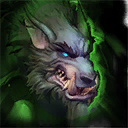 Darkflight
Darkflight, or
 The Butcher
The Butcher charged with his
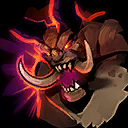 Ruthless Onslaught
Ruthless Onslaught, and dropped
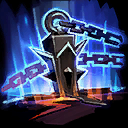 Lamb to the Slaughter
Lamb to the Slaughter and
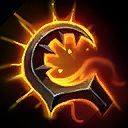 Butcher's Brand
Butcher's Brand on someone. What you want to do is find a spot to trow that hero away from your team. If you are close enough you can
 Blade Dash
Blade Dash->
 Phase Prism
Phase Prism for a swap over some terrain. Or into friendly CC like
 Mosh Pit
Mosh Pit,
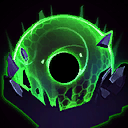 Void Prison
Void Prison, or just in the general direction of your tank. Just trowing them away back to their own team, after they have used all of their engage is also an option, that give you some breading time to deal with the rest of the enemy team. You can follow up with
 Twin Blades
Twin Blades charge, to make sure the enemy hero will have to focus you, and not your squish backliner. Or if needed you can use
 Twin Blades
Twin Blades to charge to the enemy in the first place, to perform the swap in case you are too far away.
Just remember that sometimes using only a simple
 Phase Prism to swap with the hero, can be enough to brake the charge.
As with all else in this guide, find what works best for you. And use your head to figure out the best ability to use in a situation. Don't blindly follow my combinations every time.
Phase Prism to swap with the hero, can be enough to brake the charge.
As with all else in this guide, find what works best for you. And use your head to figure out the best ability to use in a situation. Don't blindly follow my combinations every time.
The example builds. Top
Keep in mind that you should pick your build based on the teams and the development of the match. Take builds as guidelines, to help you learn what works best for you. In the "How to pick your talents" section I have left some advice to help with that.
As with most heroes you should pick individual talents depending on the situation. Those are some basic talent combinations for a number of situations. The guiding principal is this:
Build for maximum damage and utility. Swap with defensive talent at 13 and 20 if you REALLY need them.
1: Base Build - bruiser - max damage.
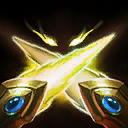 Amateur Opponent
Amateur Opponent provide a ton of utility and objective control,
 Suppression Pulse
Suppression Pulse is your teamfight game-changer, and the rest of the talents are simply there, to let you blow up people as fast as you can. I will address
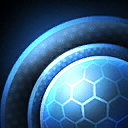 Shield Battery
Shield Battery in the talent synergy section, and why it is taken over
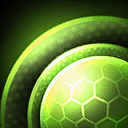 Shield Surge
Shield Surge, but the short of it is, that with those talents it gives you just enough CD reduction to proc
 Shield Overload
Shield Overload much faster and more consistent, giving you more damage absorption than
 Shield Surge
Shield Surge, while at the same time
 Shield Surge
Shield Surge with no other shield talents is just not worth it anyway.
This is the best build you can have, if things go your way all the time. The issue is that usually things will not go that way, because the enemy will be determined, not to let you win :). So this build is a prototype you sometimes have to change in game, to compensate. For example you might need to trade
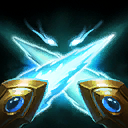 Titan Killer
Titan Killer in order to actually be able to get to a target in the first place. Or you might need to change
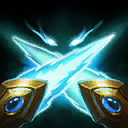 Triple Strike
Triple Strike to make sure you can survive agaisnt ability damage with
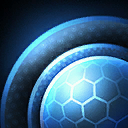 Phase Bulwark
Phase Bulwark, or to provide more playmaking swaps with
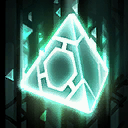 Graviton Vortex
Graviton Vortex.
This is best suited for the "In your face agresive style".
1.1: Variation - Ranged engage.
This is 1 talent change. It is recommended to use it when the enemy has multiple range heroes, who have proven to consistently avoid your attempts to swap or close the gap with them, and the frontline will not present good opportunities to blow them up. In a game where you can't consistently hit with
 Twin Blades
Twin Blades giving up
 Triple Strike
Triple Strike to assure consistency will provide better results overall. Also now using "The old school engage" consistently will even out the trade in damage against low health heroes.
1.2: Variation - Poke fights.
When you are forced to use the "Playmaker CC style." for various reasons, you have to settle on utility-over-damage mindset. If you are focused on that
 Graviton Vortex
Graviton Vortex can do a lot for you, since it will lower the cooldown of
 Phase Prism
Phase Prism to 10 seconds, making is just as long as
 Blade Dash
Blade Dash. Pair that with
 Zealot Charge
Zealot Charge for enabling and you can do some sick plays. Honestly those 2 changes make him feel much more mobile and sticky.
2: Base Build - OffTank - anti burst.
I have added the maximum protection build. Its most effective against multiple burst mages. The 2 main weaknesses of
 Artanis
Artanis are crowd control and burst damage from abilities. If you go this road you will be able to survive in a game against high ability based damage dealers, however you have to trade a sizable portion of your late game damage for it. The change from
 Triple Strike
Triple Strike to
 Phase Bulwark
Phase Bulwark will lower your burst from
 Twin Blades
Twin Blades and therefore
 Amateur Opponent
Amateur Opponent. The lack of
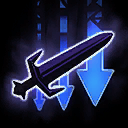 Nexus Blades
Nexus Blades will limit both your sustain damage and
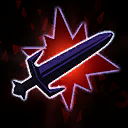 Follow Through
Follow Through synergy, as well as the ability to stick to a target since you lose the slow at 20. It is necessary to get
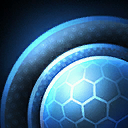 Force of Will
Force of Will at 20 with this build, to maintain high uptime to your
 Shield Overload
Shield Overload granting you synergy with
 Shield Surge
Shield Surge and
 Phase Bulwark
Phase Bulwark. It is important to note, that this is more of a reaction build to enemy team drafting ability damage. You still maintain your mobility with
 Zealot Charge
Zealot Charge and blow up potential of
 Follow Through
Follow Through. Ideally you want to have a build for maximum damage, like the first base build, but being able to respond to enemy picks is still appreciated.
2.1: Variation AOE.
This build variation goes 1 step further. You concede that killing a backline hero outside of good swap/isolation is unlikely, and accept that the enemy will be the initiators. So you trade the extra mobility of
 Zealot Charge
Zealot Charge and the single target damage of
 Follow Through
Follow Through, to build for AOE damage to get maximum waveclear, objective control, and utility. This build is only advised on maps like
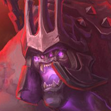 Infernal Shrines
Infernal Shrines and
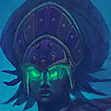 Tomb of the Spider Queen
Tomb of the Spider Queen, where you can control the objective with AOE. Also note that
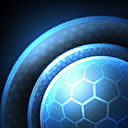 Plasma Burn
Plasma Burn is very unreliable, unless paired with the rest of the shield talents to keep
 Shield Overload
Shield Overload up for as long as possible.
Bruiser vs offTank - Picking builds.
Naturally the question "What build to pick?" is hard to answer at the very start of the game. You have to make 1 big choice between offTank and Bruiser at the start of the game, based on the compositions, and then decide what variation to use, based on the way the game progress.
Ask yourself whether you will struggle to stay alive.
[*] -
3 or more crowd control abilities that counter
 Artanis,
Artanis, (stuns, blinds and roots),
and 1 strong ability damage dealer - offTank approach.
[*] -
2 strong ability damage dealers and any CC that counters him -
offTank approach.
[*] -
In all other cases - Bruiser approach.
If you are building for offTank your level 4, 13 and 20, will be picked to survive damage. The level 7 and 16 can ether be focused on 1 target damage or Area Of Effect. Choose based on the map.
If you are building for Bruiser decide how to build, based on how much success you have, at closing the gap and securing kills.
[*] -
At 13 ask yourself if you have been relying more on aggressive attacks or on making plays with swaps and pick between
 Triple Strike
Triple Strike and
 Graviton Vortex
Graviton Vortex. If you struggle to stay alive for some reason, taking
 Phase Bulwark
Phase Bulwark is still a good option.
[*] -
At 16 ask yourself if you have problems closing the gap and reaching a certain hero you need to reach, and pick between
 Titan Killer
Titan Killer and
 Zealot Charge
Zealot Charge. If you didn't get
 Triple Strike
Triple Strike at 13, then
 Titan Killer
Titan Killer is not worth considering.
Talents in depth. Top
Here is a breakdown of all the talents as well as some notes on them. I have rated them as:
[bad] - No useful benefit and no synergy with other talents.
[average] - Useful only in builds dedicated to 1 function / boosting 1 ability.
[good] - Nice talent with good synergy with other talents. Useful in multiple situations.
Level 1
[*]
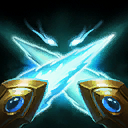 Reactive Parry -[bad]-
Reactive Parry -[bad]- At this point
 Reactive Parry
Reactive Parry is a remnant of a time, when
 Block
Block was useful. However with the addition to the game of heroes like
 Lúcio
Lúcio,
 D.Va
D.Va,
 Genji
Genji and so on,
 Block
Block has become near useless. Also
 Reactive Parry
Reactive Parry grants only 50% damage reduction, which is worse than
 Block
Block and most of its variations. The charges are granted with the activation of
 Twin Blades
Twin Blades, so it cost mana to accumulate, and the
 Triple Strike
Triple Strike talent increases the cooldown by 25%.
 Reactive Parry
Reactive Parry is extremely "early game" oriented talent. It gives you some extra survivability at the start, but becomes near useless as the game reaches higher levels. In fact it only gives you some use in the laning phase, if you are solo-laning against someone like
 Leoric
Leoric or
 Ragnaros
Ragnaros, who hit slow but very hard. The way
 Artanis
Artanis tanks damage is different from the other warriors. His base kit gives him high self-sustain, when his
 Shield Overload
Shield Overload is activated repeatedly, so blocking a few auto attacks is not important. Hitting the enemy with auto attacks to refresh the
 Shield Overload
Shield Overload cooldown is. Lastly the other talents in the tier are far superior, so even if
 Reactive Parry
Reactive Parry was good, you would be trading too much for it.
[*] Seasoned marksman
-[average]- Your main (almost only) source of actual damage are your auto-attacks. A bruiser needs to damage the enemy front-line or back-line, while managing to support the tank and stay alive. You can play
 Artanis
Artanis in full survival mode, but even then this is a better talent to have, than
 Reactive Parry
Reactive Parry. When fully stacked you can activate this for 30% increase to attack speed. For
 Artanis
Artanis this is great improvement, because now this helps with regenerating
 Shield Overload
Shield Overload faster, so this becomes a defensive talent as well. Seasoned marksman is easier to stack on maps with lanes that are close to one another, so you can rotate 2 of them. Like
 Tomb of the Spider Queen
Tomb of the Spider Queen. However
 Artanis
Artanis often needs to take the solo lane, so the attack speed buff is usually unlocked late into the game. This talent has some good offensive and defensive uses, so it is worth a try, however in my opinion
 Amateur Opponent
Amateur Opponent provides too much utility to not take. If your team has insane PvE damage Seasoned marksman is worth considering.
[*]
 Amateur Opponent -[good]-
Amateur Opponent -[good]- Thanks to D4Ni for bringing this talent to my attention. It's the most powerful talent if used properly. This is one of those "You need to see it, to believe it." talents. I was skeptical at first, but it became my my favorite talent in the tier. When you think about it most of the time you are not hitting heroes, but other "stuff". Including those that are objective related. Its very similar to
 Lunara
Lunara's talent -
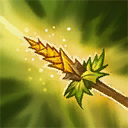 Nature's Culling
Nature's Culling, but you get it at level 1, not 7 and you are not a
squishy assassin. In a way you get double the late game bonus damage from Seasoned marksman at level 1, but you can't use it on heroes.
 Amateur Opponent offers too much utility not to take. You can right-click Immortals on
Amateur Opponent offers too much utility not to take. You can right-click Immortals on
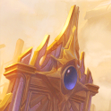 Battlefield Of Eternity and melt them with your
Battlefield Of Eternity and melt them with your
 Twin Blades. If the other team takes the immortal, you will be glad for this talent as well when defending. You can also solo camps early on so your team can take 3 camps and leave the other team only 1. This is very useful when you want to solo the Shaman camp and time it so it pushed during the immortal Phase. On
Twin Blades. If the other team takes the immortal, you will be glad for this talent as well when defending. You can also solo camps early on so your team can take 3 camps and leave the other team only 1. This is very useful when you want to solo the Shaman camp and time it so it pushed during the immortal Phase. On
 Infernal Shrines helps a lot with getting the punisher fast, or killing him if you lost the objective. Gathering seeds on
Infernal Shrines helps a lot with getting the punisher fast, or killing him if you lost the objective. Gathering seeds on
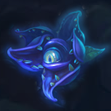 Garden of Terror is a breeze and there are plenty of murk camps, however the Terror itself is considered heroic unit, so you get no bonus against him! Now it takes 2 or 3 people to get a boss in 30-40 seconds around level 10, so you can sneak it, while the rest of the team is distracting the enemy. That is especially helpful on
Garden of Terror is a breeze and there are plenty of murk camps, however the Terror itself is considered heroic unit, so you get no bonus against him! Now it takes 2 or 3 people to get a boss in 30-40 seconds around level 10, so you can sneak it, while the rest of the team is distracting the enemy. That is especially helpful on
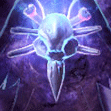 Cursed Hollow. Also good on
Cursed Hollow. Also good on
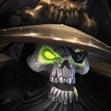 Blackheart's Bay to take early boss and level the top fort to the ground, basically saving 12 coins for the turn in. :) Besides the whole map is going around killing camps, so now you do it 3 times faster. Oh and did I mention you obliterate defenses like they are made of paper, and you can hold powerful mercenary pushes if needed?
Blackheart's Bay to take early boss and level the top fort to the ground, basically saving 12 coins for the turn in. :) Besides the whole map is going around killing camps, so now you do it 3 times faster. Oh and did I mention you obliterate defenses like they are made of paper, and you can hold powerful mercenary pushes if needed?
Level 4
This tier has the least impact on the game.
[*]
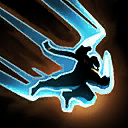 Psionic Synergy -[bad]-
Psionic Synergy -[bad]- So this lets you get the same benefits as a simple AA, but wasting twice the execution time, drains mana and can put you out of position. Unless you hit at least 2 or 3 targets with
 Blade Dash
Blade Dash or 1 target 2 times, it's not worth it. Also many times you will use
 Blade Dash
Blade Dash and not hit a hero at all, like doing a swap or clearing minions.
[*]
 Shield Battery -[average]-
Shield Battery -[average]- On the surface this talent is bad. Even if
 Shield Overload
Shield Overload lasts its full duration, you will still get minimal benefit from this. And the shield will never really last the full duration. Especially in a team-fight. Especially late game. However this talent actually works the exact opposite way of what seams rational. You would think that to get more value you need teh shield to last as long as possible, and to get as many CD reduction talents as you can. But the opposite is true.
 Shield Battery
Shield Battery needs
 Shield Overload
Shield Overload to be active for 2 seconds to get max value, and any other cooldown reduction talent renders
 Shield Battery
Shield Battery useless. If you test the flow of a battle, you will notice that
 Shield Battery
Shield Battery is actually worth 4 seconds of cooldown reduction. As
 Shield Overload
Shield Overload activates, the 24 second cooldown starts to tick. In that time you activate
 Twin Blades
Twin Blades 1 time, and attack with 1 autoattack per second. So
 Twin Blades
Twin Blades regenerates 8 seconds, and each second after the activation of
 Shield Overload
Shield Overload regenerates 5 seconds (1 second of time passes +4 seconds from 1 auto attack). So in about 3 seconds you will regenerate exactly 23 seconds of the cooldown, which is 24 seconds.
 Shield Battery
Shield Battery is enough to push those 23 seconds to 24 and activate another
 Shield Overload
Shield Overload, starting the process again. If you don't have
 Shield Battery
Shield Battery, you need 1 more second (auto attack) to recharge it. Which means that
 Shield Battery
Shield Battery pushes the cooldown past 24 seconds, so that 1 extra auto attack is instead used, to recharge the cooldown of the next
 Shield Overload
Shield Overload by 4 seconds. But a talent like
 Triple Strike
Triple Strike,
 Force of Will
Force of Will or even
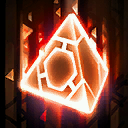 Chrono Surge
Chrono Surge brakes that situation, rendering
 Shield Battery
Shield Battery useless. Even though I use
 Triple Strike
Triple Strike in the same build, the value of a consistent shield activations before level 13 is worth taking this talent over
 Shield Surge
Shield Surge. Besides as the game progresses, you might need to take another talent at 13, so
 Shield Battery
Shield Battery is a good to have in that case. It is the best general solution. It it has to be noted, that the math is true under almost perfect conditions, but sometimes (most of the time) you will not time
 Twin Blades
Twin Blades perfectly, have to use another ability, or simple
 Shield Overload
Shield Overload will activate between auto attacks, so the gap that has to be closed will be slightly longer, so
 Shield Surge just makes the flow of battle better overall, letting you regenerate the shield with 3 auto attacks instead of 4 consistently
Shield Surge just makes the flow of battle better overall, letting you regenerate the shield with 3 auto attacks instead of 4 consistently.
[*]
 Shield Surge -[average]-
Shield Surge -[average]- Another average talent, that grans you a bit more shield when you are about to die. The issue with
 Shield Surge
Shield Surge is, that when it actually helps you, you want to be getting out of the fight not keep fighting. That makes it a 1 time thing, unless you build for full shields at 13 and 20. If
 Shield Surge
Shield Surge would activate at an earlier stage, it would be the best talent in the tier, with no contest. It is still the only talent that consistently helps you the whole game, no matter how small that help is. If you have decided to run offTank
 Artanis
Artanis,
 Shield Surge
Shield Surge provides best synergy with the other shield talents, so it becomes much better option than
 Shield Battery
Shield Battery.
Level 7
[*]
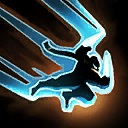 Solarite Reaper -[good]-
Solarite Reaper -[good]- Extra damage is always welcome. The change is not that big to significantly affect a hero fight, unless you can hit 3+ heroes constantly, however it brings good utility. It can help in lane to gather stacks for Seasoned marksman, wave clear faster, and to control some objectives like the one on
 Infernal Shrines
Infernal Shrines. The damage boost from
 Follow Through
Follow Through, is much better against single targets.
[*]
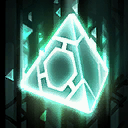 Warp Sickness -[average]-
Warp Sickness -[average]- Can help stick to a target, but you don't really need it after since you have charge with your
 Twin Blades
Twin Blades. Besides the damage benefits of
 Follow Through
Follow Through will do as much damage, as you would for the duration of the slow, and don't limit you to have to land
 Phase Prism
Phase Prism. In reality this talent is an improvement to your crowd control. With a properly coordinated team its the best pick of the tear, because it lets you
and your team to burst the target. Also can save your teammates from a charging opponent such as
 Illidan
Illidan or
 Sonya
Sonya. The synergy with
 Graviton Vortex
Graviton Vortex at level 13 is great and makes for a really fun play-style. But I stress again - you really need good coordination with your team for this talent to be of use. I would recommend using it if you have that team, and in some situations, when all the extra peel your team can get is precious.
[*]
 Chrono Surge
Chrono Surge.
-[bad]- Used to be good before the last
 Artanis
Artanis rework. Not anymore. In theory the increase to attack speed lets you regenerate
 Shield Overload
Shield Overload faster, so it actually helps you defensively as well, and rises your damage output. However you get the bonus ONLY if you hit a hero with
 Phase Prism
Phase Prism! Also the rate of shield recharge is now much lower and the way you use your abilities make the benefits of this talent both too small and revived at the wrong time. It is also outclassed by all other talents in the tier.
[*]
 Follow Through -[good]-
Follow Through -[good]- The damage boost is not that great, but the talent works well in synergy with Seasoned marksman,
 Zealot Charge
Zealot Charge,
 Amateur Opponent
Amateur Opponent and your other abilities. Past level 16 you can chain
 Twin Blades
Twin Blades -AA-
 Phase Prism
Phase Prism -AA- -AA-
 Blade Dash
Blade Dash with ease. It's a major burst damage to the backline. Unfortunately you wont be landing an AA after
 Blade Dash
Blade Dash most of the time, but still this is consistent single target damage, that benefits from many other talent tiers.
Level 10
[*]
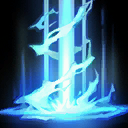 Purifier Beam -[average]-
Purifier Beam -[average]- Lots of damage with global cast range. Yes please! :) Unfortunately you never get to do the damage unless your target is rooted, stunned, or severally slowed for a lot of time. Also the cast time is too long to use after the enemy is disabled. You have to cast and then someone else has to disable the target, because
 Artanis
Artanis has no such disables. Powerful, but sadly ineffective.
[*]
 Suppression Pulse -[good]-
Suppression Pulse -[good]- The reasoning for taking this is simple. The cases where you can actually kill someone with
 Purifier Beam
Purifier Beam are greatly limited. At best you end up zoning 1 hero away and not effectively at that. Unless that hero is
 Lt. Morales
Lt. Morales its not worth it. What
 Suppression Pulse
Suppression Pulse gives you is a great initiation of a fight, or the ability to cast it mid fight to prevent the whole enemy team, from damaging your teammates for a long time. That can force a fight at key point where your team starts with big advantage, or can turn a fight around. Also makes heroes like
 Raynor
Raynor,
 Valla
Valla,
 Illidan
Illidan,
 Lunara
Lunara,
 The Butcher
The Butcher,
 Tychus
Tychus... useless for a long time. There is no delay for the cast. In fact you can use it without even slowing your walk. This ability cast defensively, during a retreat has saved me and my teammates more than once. If you hear the sound of
 Illidan
Illidan's
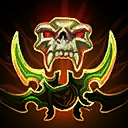 The Hunt
The Hunt heroic, look at the minimap, find his target and drop
 Suppression Pulse
Suppression Pulse there immediately. This can save a teammate from the other side of the map, and get
 Illidan
Illidan killed easily. Also
 Suppression Pulse
Suppression Pulse, combined with
 Sylvanas
Sylvanas's
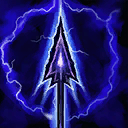 Wailing Arrow
Wailing Arrow, can render the whole enemy team useless and defenseless.
Level 13
[*]
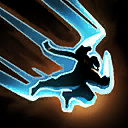 Templar's Zeal -[bad]-
Templar's Zeal -[bad]- Another relic of times past. Let's be honest,
 Blade Dash
Blade Dash used on it's own is not good. And
 Artanis
Artanis can't spam abilities for long before running out of mana.
[*]
 Triple Strike -[good]-
Triple Strike -[good]- This is your go-to talent. With the increased cooldown, it gives you only 2 extra attacks for 20 seconds, but the new way
 Artanis
Artanis behaves in a fight makes the extra burst damage extra valuable. Its a viable pick when there are many squishy enemies, that you can burst down with 2 or 3
 Twin Blades
Twin Blades casts. Another reason to pick this is synergy with other talents. If you opted for
 Amateur Opponent
Amateur Opponent at level 1, you will want to take this talent when forced to kill big single targets (Immortals). Also an extra attack means extra reduction to
 Shield Overload
Shield Overload cool-down, so in a way, this gives you both damage and defense capability.
[*]
 Graviton Vortex -[good]-
Graviton Vortex -[good]- perhaps the only talent improving
 Phase Prism
Phase Prism, that is worth taking. The cool-down is what you want here. You almost never want to pull 2 enemies at your team, because it's counterproductive. The synergy with
 Warp Sickness
Warp Sickness at level 7 is very nice to pull enemies away from your teammates, against a "rush" team, who wants to kill your squishies. The fact that you have 2 other powerful talents in this tier, makes
 Graviton Vortex
Graviton Vortex a tough thing to recommend. Overall
 Graviton Vortex
Graviton Vortex is the best choice to help your team, but you have to trade your own damage potential and survivability. With a well coordinated team, and you landing your swaps reliably through the game its the best pick.
[*]
 Phase Bulwark -[good]-
Phase Bulwark -[good]- You are a warrior, and a bruiser needs survivability. This is a safety pick, but if you have no problem surviving its better to take a different talent. If the enemy has no strong casters it's also not such a good pick. If you are pressed hard
 Phase Bulwark
Phase Bulwark is irreplaceable on this tier, even though you have to sacrifice some damage for it. Remember that a dead hero dose NO DAMAGE. The duration of 4 seconds, even after the shield is destroyed and the synergy with
 Force of Will
Force of Will at level 20, makes it so that
 Shield Overload
Shield Overload grants you constant 40% ability armor, making
 Artanis
Artanis one of the few heroes left in the game, who can deal reliably with both ability and auto attack damage.
Level 16
[*]
 Zealot Charge -[good]-
Zealot Charge -[good]- In some situations you will find yourself needing that little extra reach, especially if you are facing lots of ranged enemies. I strongly advise to take this if playing against
 Tracer
Tracer. This talent is all about enabling you. So if you are doing just fine, and can stick to enemies well enough, jsut grab another talent for more damage.
[*]
 Titan Killer -[good]-
Titan Killer -[good]- A version of
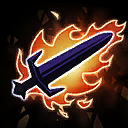 Giant Killer
Giant Killer, but the effect only works with
 Twin Blades
Twin Blades. Powerful against tanky heroes. If you can stick to a target this is quite good pick, especially against double warrior comps. Also synergies very well with
 Triple Strike
Triple Strike. I would go as far as saying it needs
 Triple Strike
Triple Strike to be effective. Definitely take against
 Cho
Cho
 Gall
Gall. Also adds damage against the Terror on
 Garden of Terror
Garden of Terror and the Dragon Knight on
 Dragon Shire
Dragon Shire.
[*]
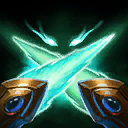 Psionic Wound -[bad]-
Psionic Wound -[bad]- This is very counter productive in a team-fight, because your primary damage comes from
 Twin Blades
Twin Blades and the vulnerability effect starts after you use it. It mainly relies on your team to put damage in the next 2 seconds. The fact it only works on heroes still makes it way less useful too. In a highly coordinated teams this can get insane value, particularly with a full swap build at 7 and 13, but this is only true in high levels of Hero League.
[*]
 Plasma Burn -[average]-
Plasma Burn -[average]- Form of
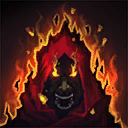 Burning Rage
Burning Rage. In the long run
 Plasma Burn
Plasma Burn can provides you with far more damage than
 Titan Killer
Titan Killer, since it is AOE and does damage even if you are not attacking or you are using abilities. But it is only active as long as the shield from
 Shield Overload
Shield Overload is active. This makes it only viable with full shield build, and less useful than the generic
 Burning Rage
Burning Rage. However there are many uses for it. When the enemy team sends waves of murks toward your base you can clear far better. Also when you can't push past the minions and hit defensive structures fast enough, or on
 Infernal Shrines
Infernal Shrines to secure the Punisher. Also helps a lot defending Webweavers on
 Tomb of the Spider Queen
Tomb of the Spider Queen. Note that the damage apples to invisible objects, so it will burn and reveal creep tumors, mines, stealth heroes and so on.
Level 20
[*]
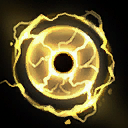 Orbital Bombardment -[average]-
Orbital Bombardment -[average]- This is worth considering against heavy auto-attack comps with 2 or more AA heroes such as
 Raynor
Raynor,
 Valla
Valla,
 Illidan
Illidan... Especially if you manage to survive fights, but your squishier teammates don't. Rendering the DPS assassins useless for 4 seconds is nice. Doing it for 8 seconds is twice as nice. However usually 1 Orbital strike is more than enough, since the cool-down is fairly short and Orbital strike is always ready for every fight.
[*]
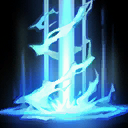 Target Purified -[bad]-
Target Purified -[bad]- This reminds me of a way weaker version to
 Nova
Nova's
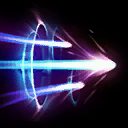 Fast Reload
Fast Reload ability, and it has minuscule usefulness. You will be very lucky to kill 1 hero with
 Purifier Beam
Purifier Beam, but multiple kills is just unrealistic, unless you are the grandmaster god of awesomeness, and can time it so it wipes the whole enemy team.
[*]
 Nexus Blades -[good]-
Nexus Blades -[good]- If you are ahead and don't need extra defense get
 Nexus Blades
Nexus Blades for insane damage boost. The synergy with all other auto attack talents is great. If you get Seasoned marksman or
 Amateur Opponent
Amateur Opponent, with
 Follow Through
Follow Through,
 Triple Strike
Triple Strike and
 Titan Killer
Titan Killer, then
 Nexus Blades
Nexus Blades is the final nail in the coffin. Around level 22-23, witch with
 Nexus Blades
Nexus Blades, can rise your damage to 350-400 per attack. A tanky hero with 1200 burst every 5 seconds and 400 DPS is scary to face in combat.
[*]
 Force of Will -[good]-
Force of Will -[good]-
 Force of Will
Force of Will lets you recharge the cool-down of
 Shield Overload
Shield Overload every time you use
 Twin Blades
Twin Blades, if you have
 Triple Strike
Triple Strike because you will always land an AA before/after it. That means every 5 seconds. In fact this talent can make is so that you stack your shields up to 4 times one after another, if you time your abilities well, making you near invincible. Constantly recharging your shields, often can be the difference between victorious, or dead
 Artanis
Artanis. The synergy with
 Shield Surge
Shield Surge and
 Phase Bulwark
Phase Bulwark gives you permanent 40% reduction to ability damage.
How to play the maps. (Will add the ther maps soon) Top
Battlefield of Eternity - God-Killer.
[*] How to secure the objective: The idea is to gang the immortal as a team, as soon as it spawns, and burst him as fast as possible. During the immortal phase you should be focusing the immortal, and ignore everything else around you 90% of the times, provided the 2 teams are on even playfield. If the other team has gained a significant immortal lead and activated the mid-phase immortal swap and you have no damage done, or if they are determined to force a fight, act accordingly.
[*] Between objectives: In the breaks between immortal spawns your job is to kill the back camp near your base. Make sure to tell your team, to take the siege camps top and bottom of the map and solo this backward camp yourself. That way you will get 3 out of 4 camps and have big advantage for the next immortal phase. Try to time that camp, killing the murks, but staying there and taking it just as the announcement for immortals spawning is given. That way the shaman camp has to be cleaned by the enemy, unless they want ti to kill all of their defenses, including the keep. A very often seen mistake is to take this camp too early, so it is cleared before the immortals spawn and gets no value.
[*] If you lose the objective: Try to focus your damage on the enemy immortal. You still deal 250% damage to him.
8:Mini Punisher. (Infernal Shrines).
[*] How to secure the objective: The AOE damage of your improved
 Blade Dash
Blade Dash and
 Plasma Burn
Plasma Burn can help secure the objective really fast. However that is rarely the best talent path. During the fighting for the shrine its hard to divide the team's attention. You have to kill spawns for the objective and fight the other team.
 Purifier Beam
Purifier Beam can zone an enemy away, making this task even harder for them. While targeting an enemy inside the shrine it will also kill spawns with no danger for you or your team. Also many teams tend to clump inside the shrine so damaging multiple heroes is an option, especially since your team will probably try to stun, or slow multiple enemies there. Yet this is another talent, that is not often commended. In general just try to focus on 1 thing - ether killing the enemy or taking the minions, but not engaging hard. You can't do both. When you have the Punisher push with him and try to deal structural damage yourself. You can burst down the gate and allow your team to get in with Ammateur Opponent, and provide support to the Punisher, maximizing his usefulness greatly.
[*] Between objectives: Again between shrines your job is to secure camps. There is a shaman camp on this map too.
[*] If you lose the objective: In case the Punisher gets taken by the enemy, your
 Amateur Opponent
Amateur Opponent talent is great for killing him. Make sure to lure the Punisher to jump over the wall, so all 3 turrets and the fort will shoot at him and the enemy can't provide support, before they break the wall. Its simple to do. The Punisher will jump on and stun the first hero he seas so just stay right behind your own fort wall and make sure all your teammates are behind you.
9:Lane-pusher AOE. (Tomb of the Spider Queen).
This map require you to kill lots of small minions and lane a lot. You also have to defend from the Webweavers, the spiders they spawn, and the minion waves when the enemy takes an objective.
 Artanis
Artanis is not good at AOE damage in team fights. For this map however he can easily clean a push with a Webweaver alone and prevent the snowballing effect the map has. The AOE build is not optimal at all, but this small map is ideal to gather stacks on your Seasoned marksman, especially if you roam between 2 lanes early game, so the drop in single target damage should can be offset this way.The Webweaver is nowhere near as strong as Immortal or Punisher so I find that
 Amateur Opponent
Amateur Opponent is not as strong, but still great choice here.
I hope this helped you to master the leader of all Protos.
Good luck and See you in the Nexsus. :)
![]()




Quick Comment (4) View Comments
You need to log in before commenting.